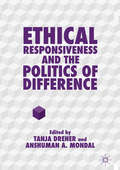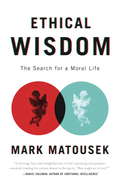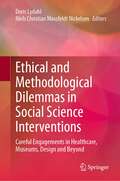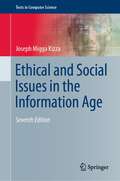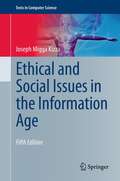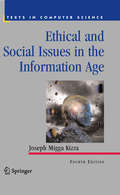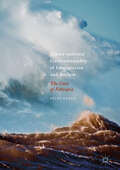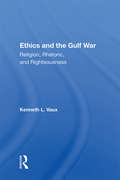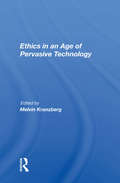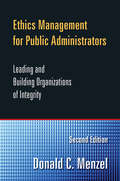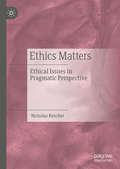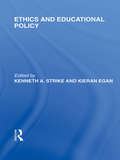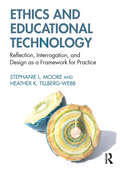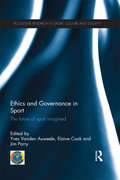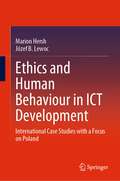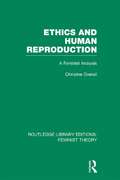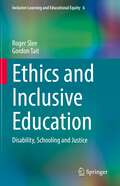- Table View
- List View
Ethical Responsiveness and the Politics of Difference
by Anshuman A. Mondal Tanja DreherThis edited collection focuses on the ethics, politics and practices of responsiveness in the context of racism, inequality, difference and controversy. The politics of difference has long been concerned with speech, voice and representation. By focusing on the practices and politics of responsiveness—listening, reading and witnessing—the volume identifies vital new possibilities for ethics and social justice. Chapters focus on the conditions of possibility, or listening as ethical praxis; unsettling or disrupting colonial relationships; and ways of listening that highlight non-Western traditions and move beyond the liberal frame. Ethical responsiveness shifts some of the responsibility for negotiating difference and more just futures from subordinated speakers, and on to the relatively more privileged and powerful.
Ethical Trade, Gender and Sustainable Livelihoods: Women Smallholders and Ethicality in Kenya
by Kiah SmithFair and ethical trade is often criticized for being highly gendered, and for institutionalizing the ethical values of consumers, the priorities of NGOs and governments, and most of all, food retailers. But little is known about how women smallholder farmers experience diverse ethical standards, or whether and how standards reflect their values, local cultural and environmental contexts, or priorities for achieving sustainable livelihoods. Linking gender, smallholder livelihoods and global ethical trade regulations, this book reveals that multiple understandings of social justice, environmental sustainability and well-being – or ethicality – exist in parallel to those institutionalized in ethical trade schemes. Through an in-depth case study of smallholder subsistence and French bean farming in Kenya, the book grounds the analysis of livelihoods, gender and ethical trade in women smallholders’ perspectives, links the macro level of markets with the micro level of livelihoods, and engenders relations of power, structure and agency in food networks. It brings together disparate bodies of theory to illustrate the knowledge, strategies and values of women smallholder farmers that are often beyond the scope of ethical trade regulations. It also provides a challenging new vision for doing food systems research.
Ethical Violence
by Carlo BordoniHuman civilization is founded on ethical principles, norms of behaviour that have accumulated over time. Perhaps the oldest of ethical principles is the rejection of violence, which includes the respect for life and for the physical and psychological integrity of others. But, in some circumstances, violence itself can be regarded as ethical – for example, when it is used by states claiming to act in self-defence. In these circumstances, the need to defend oneself against an enemy can transform war from an unacceptable act into a necessary, socially shared and morally sanctioned choice. And it is when violence becomes ethical that we must begin to fear for our future. In the wake of the pandemic, we are witnessing the growing prevalence of aggression and emotionality in social and political life. We find ourselves living in an increasingly impatient and insecure society, which is sceptical of scientific thought and which takes refuge in the irrational. The decline of rationality and the growing prevalence of violence are increasingly common features of a society that has lost touch with the great Enlightenment narrative. We need, argues Bordoni, to rediscover the rationality we have lost and recuperate the positive side of technology.
Ethical Wisdom: What Makes Us Good
by Mark MatousekSince the days of the first primitive tribes, we have tried to determine why one man is good and another evil. Mark Matousek arrives at the answer in Ethical Wisdom.Contrary to what we've been taught in our reason-obsessed culture, emotions are the bedrock of ethical life; without them, human beings cannot be empathic, moral, or good.But how do we make the judgment call between self-interest and caring for others? What does being good really mean? Which parts of morality are biological, which ethical? When should instinct be trusted and when does it lead us into trouble? How can we know ourselves to be good amidst the hypocrisy, fears, and sabotaging appetites that pervade our two-sided natures?Drawing on the latest scientific research and interviews with social scientists, spiritual leaders, ex-cons, altruists, and philosophers, Matousek examines morality from a scientific, sociological, and anthropological standpoint. Each chapter features a series of questions, readings, interviews, parables, and anecdotes that zoom in on a particular niche of moral inquiry, making this book both utilitarian and fun.Ethical Wisdom is an insightful and important book for readers crisscrossing their own murky moral terrain.From the Hardcover edition.
Ethical and Methodological Dilemmas in Social Science Interventions: Careful Engagements in Healthcare, Museums, Design and Beyond
by Niels Christian Mossfeldt Nickelsen Doris LydahlThis book develops an understanding of researchers' engagements with their subjects as a generative mode of knowledge production that takes place between researchers and their research fields. It promotes the idea that rather than value neutrality, caring may be helpful when a researcher makes suggestions for improvement and constructs interventions. The authors reflect on questions such as how researchers take can sides without taking a fundamental principle of action for granted. What tensions and obstacles do researchers meet while they strive to engage carefully? How do careful engagements affect academic work and output? What inequalities are produced especially when there is funding involved in the research? The contributions discuss a range of topics including responsibility (and response-ability), collaboration, proximity, ethics, bodily entanglements, values, and affective attachments in social research. The book brings together an impressive team of international researchers from different disciplines to nuance the discussion and provides a rich collection of empirical studies from healthcare, urban planning, environmental science, participatory design, and museums, among others. This is a very topical volume for all social and behavioural scientists engaging in research, particularly those engaged in ethnographic research.
Ethical and Secure Computing: A Concise Module (Undergraduate Topics in Computer Science)
by Joseph Migga KizzaThis textbook highlights the essential need for a strong ethical framework in our approach to teaching of and working in computer, information and engineering sciences.Through thought-provoking questions and case studies, the reader is challenged to consider the deeper implications arising from the use of today’s rapidly evolving computing technologies and ever-changing communication ecosystems.This thoroughly revised and updated third edition features revised chapters with new and updated content and hardened the ethical framework. To cope with the rapidly changing computing and telecommunication ecosystem, a new chapter, Ethics and Social Responsibility in the Metaverse, has been added. The interface between our current universe and the evolving metaverse presents a security quagmire. The discussion throughout the book is candid and intended to ignite students’ and professionals’ interest and active participation in discussions of the issues we are facing now and those likely to emerge in the near future. Topics and features—including fully updated content:Introduces a philosophical framework and tools for understanding and analyzing computer ethics in personal, public, and professional spheresDescribes the impact of computer technology on issues of security, privacy, anonymity, and civil libertiesDiscusses the security and ethical quagmire in the platforms of the developing metaverse (NEW chapter)Examines intellectual property rights in the context of computing, including the risks and liabilities associated with softwareDiscusses such key social issues in computing as the digital divide, employee monitoring in the workplace, and risks to physical and mental healthReviews the history of computer crime, and the threat of digitally facilitated bullying, harassment, and discriminationConsiders the ethical challenges arising from online social networks, mobile telecommunication technologies, virtual reality, the Internet of Things and 5G technologiesIncludes learning objectives, discussion questions and exercises throughoutThis concise and accessible work addresses the critical ethical and moral issues important to all designers and users of computer technologies. The text incorporates the latest curricula requirements for undergraduate courses in computer science, as well as offers invaluable insights into the social impact and legal challenges posed by the latest generation of computing devices and networks.
Ethical and Social Issues in the Information Age (Texts in Computer Science)
by Joseph Migga KizzaThis textbook examines the ethical, social, and policy challenges arising from our rapidly and continuously evolving computing technology—ranging from the Internet, over to the cross-platforms consisting of ubiquitous portable and wearable devices to the eagerly anticipated metaverse—and how we can responsibly access and use these spaces. The text emphasizes the need for a strong ethical framework for all applications of computer science and engineering in our professional and personal life.This comprehensive seventh edition features thoroughly revised chapters with new and updated content, hardened by the bedrock ethical and moral values. Because of the rapidly changing computing and telecommunication ecosystem, a new chapter on Ethics and Social Responsibility in the Metaverse has been added. The interface between our current universe and the evolving metaverse presents a security quagmire. The discussion throughout the book is candid and intended to ignite students' interest and participation in class discussions and beyond. Topics and features:Establishes a philosophical framework and analytical tools for discussing moral theories and problems in ethical relativismOffers pertinent discussions on privacy, surveillance, employee monitoring, biometrics, civil liberties, harassment, the digital divide, and discriminationDiscusses the security and ethical quagmire in the platforms of the developing metaverseProvides exercises, objectives, and issues for discussion with every chapterExamines the ethical, cultural and economic realities of mobile telecommunications, computer social network ecosystems, and virtualization technologyReviews issues of property rights, responsibility and accountability relating to information technology and softwareExplores the evolution of electronic crime, network security, and computer forensicsIntroduces the new frontiers of ethics: virtual reality, artificial intelligence, and the InternetThis extensive textbook/reference addresses the latest curricula requirements for understanding the cultural, social, legal, and ethical issues in computer science and related fields, and offers invaluable advice for industry professionals wishing to put such principles into practice.
Ethical and Social Issues in the Information Age (Texts in Computer Science)
by Joseph Migga KizzaThis new edition examines the ethical, social, and policy challenges stemming from computing and telecommunication technology, and mobile information-enabling devices. Features: establishes a philosophical framework and analytical tools for discussing moral theories and problems in ethical relativism; offers pertinent discussions on privacy, surveillance, employee monitoring, biometrics, civil liberties, harassment, the digital divide, and discrimination; examines the new ethical, cultural and economic realities of computer social networks; reviews issues of property rights, responsibility and accountability relating to IT and software; discusses how virtualization technology informs ethical behavior; introduces the frontiers of ethics in VR, AI, and the Internet; surveys the social, moral and ethical value systems in mobile telecommunications; explores the evolution of electronic crime, network security, and computer forensics; provides exercises, objectives, and issues for discussion in every chapter.
Ethical and Social Issues in the Information Age, 4th Edition
by Joseph Migga KizzaThe frequency of new editions of this book is indicative of the rapid and tremendous changes in the fields of computer and information sciences. First published in 1995, the book has rapidly gone through three editions already and now we are in the fourth. Over this period, we have become more dependent on computer and telecommunication technology than ever before and computer technology has become ubiquitous. Since I started writing on social computing, I have been advocating a time when we, as individuals and as nations, will become totally dependent on computing technology. That time is almost on us. Evidence of this is embodied in the rapid convergence of telecommunication, broadcasting, and computing devices; the miniaturization of these devices; and the ever increasing storage capacity , speed of computation, and ease of use. These qualities have been a big pulling force sucking in millions of new users every day, sometimes even those unwilling. Other appealing features of these devices are the increasing number of applications, apps, as they are increasingly becoming known, and being wireless and easily portable. Whether small or big, these new gizmos have become the centerpiece of an individual’s social and economic activities and the main access point for all information. Individuals aside, computing technology has also become the engine that drives the nations’ strategic and security infrastructures that control power grids, gas and oil storage facilities, transportation, and all forms of national communication, including emergency services.
Ethical and Social Issues in the Information Age, 5th Edition
by Joseph Migga KizzaThis new edition examines the ethical, social, and policy challenges stemming from computing and telecommunication technology, and mobile information-enabling devices. Features: establishes a philosophical framework and analytical tools for discussing moral theories and problems in ethical relativism; offers pertinent discussions on privacy, surveillance, employee monitoring, biometrics, civil liberties, harassment, the digital divide, and discrimination; examines the new ethical, cultural and economic realities of computer social networks; reviews issues of property rights, responsibility and accountability relating to IT and software; discusses how virtualization technology informs ethical behavior; introduces the frontiers of ethics in VR, AI, and the Internet; surveys the social, moral and ethical value systems in mobile telecommunications; explores the evolution of electronic crime, network security, and computer forensics; provides exercises, objectives, and issues for discussion in every chapter.
Ethico-political Governmentality of Immigration and Asylum: The Case of Ethiopia
by Dilek KaralBased on content analyses of three international organizations’ policy reports and interviews with Somali refugees and refugee organizations, Dilek Karal examines the construction of ethico-political paradigm for immigration and asylum policies in Ethiopia. Departing from an assertion that ethico-political power is an intrinsic part of neo-liberal governmentality (and thus immigration and asylum policy formation), this volume unearths its mechanisms in Ethiopia’s current immigration and refugee legislation and in global policy propositions moving forward. Ultimately, the exclusionary character of the propositions for Ethiopian states’ governance of migrants is revealed through close interviews, data analysis, and applied analytics of governmentality method.
Ethics And The Gulf War: Religion, Rhetoric, And Righteousness
by Kenneth L. VauxThe war on the ground and in the air over Kuwait and Iraq was not the only Gulf War being fought in early 1990. George Bush and Saddam Hussein were also battling for public opinion and for the perception of legitimacy for their actions. In this effort, both men as well as their spokespersons appealed to the just war theory of their religious traditions. In this perceptive and wide-ranging book, Kenneth Vaux elucidates the great just war traditions of Judaism, Christianity, and Islam, evaluating the key events of the war in light of the religious rhetoric used by both sides. From the first stirrings of conflict to its uncertain aftermath, religious and ethical traditions played a major role in winning support not just for the U.S. and Iraqi peoples but of public opinion worldwide. Throughout Vaux demonstrates the wide gaps between religious rhetoric and the political-military action it has been called on to support. Ethics and the Gulf War is not a typical ethical treatise; Vaux understands ethical reflection to encompass history, philosophy, psychology, ecology, theology, and eschatology. His book is a valuable contribution to the understanding of the Gulf War, and it is fascinating for scholars and laypersons coming to this subject from almost any area of interest.
Ethics In An Age Of Pervasive Technology
by Melvin KranzbergGrappling with the moral dimensions of the ways in which technology is applied in today's world, some of the keenest minds of our time raise and attempt to answer four major questions: Do our current problems represent a new element in human affairs or are they merely a continuation of past problems altered somewhat by the pervasiveness of technolo
Ethics Management for Public Administrators: Building Organizations of Integrity
by Donald C MenzelAs with the first edition, this practical book is dedicated to building organizations of integrity. It has been written for students contemplating careers in public service, elected and appointed officials, administrators, and career public servants in America and abroad.
Ethics Matters: Ethical Issues in Pragmatic Perspective
by Nicholas RescherThis book covers a varied spectrum of ethical topics, ranging from the fundamental considerations regarding ethical values, to the rationale of obligation, and the ethical management of societal and personal affairs. Nicholas Rescher shows how fundamental general principles underpin the pragmatic stance we can appropriately take on questions of specific ethical detail. His work on these issues is pervaded by a certain pragmatic point of view. As the popular dictum has it, we humans come this way but once, with just a single lifetime available, to each one of us. Rescher argues that it is a matter of rational self-interest and ethical obligation to use this opportunity for doing something towards making the world a better home for ourselves and our posterity.
Ethics and Biopower in Neuromarketing: A Framework for an Ethical Approach to Marketing
by Joshua PenrodThis book explores the ethical and policy implications of the use of neuroscience in marketing. Addressing emerging areas of neuromarketing and consumer neuroscience, this book offers a fresh perspective on establishing a framework for codes of conduct for marketing practices using neuroscientific methods. The use of neuroscience, particularly in commercial and marketing contexts, has been fraught with controversy and ethical concerns. Technological advances have enhanced the ability to not only analyze but also predict (or even control) human behavior. Using the work of Foucault on biopower, the author discusses the moral dimensions of data collection and observation of consumer behavior in neuromarketing as well as policy implications. After discussing the strengths and weaknesses of various ethical frameworks, the author proposes fixes to current ethical and conduct codes for a more seamless approach for governance. This book advances the scholarship on marketing ethics and appeals to researchers of consumer psychology, business ethics, and public policy.
Ethics and Educational Policy (International Library of the Philosophy of Education Volume 21)
by Kenneth A. StrikeThis is a philosophical treatment of the conceptual and normative aspects of topics which are currently a matter of policy debate in education. The authors have focussed on such concepts as liberty, autonomy, equality and pluralism, and have provided a philosophical commentary which relates these concepts both to a background of philosophical literature, and to the institutional contexts and policy debates in which they function. The book will be of significance to all policy makers who need to gain an understanding of the values and concepts involved in major policy problems.
Ethics and Educational Technology: Reflection, Interrogation, and Design as a Framework for Practice
by Stephanie L. Moore Heather K. Tillberg-WebbEthics and Educational Technology explores the creation and implementation of learning technologies through an applied ethical lens. The success of digital tools and platforms in today’s multi-faceted learning and performance contexts is dependent not only on effective design and pedagogical principles but, further, on an awareness of these technologies’ interactions with and implications for users and social systems. This first-of-its-kind book provides an evidence-based, process-oriented model for ethics in technology-driven instructional design and development, one that necessitates intentional reflective practice, a critical and theoretically informed interrogation of technology, and a participatory approach to technology design and applications. Rich with real-world ethics examples and design cases, supported by reflection questions and applied activities, and attentive to ethical codes among preeminent educational technology organizations, this is an ideal resource for students, faculty, researchers, and professionals across educational technology, instructional design, learning sciences, learning engineering, organizational training, and other disciplines.
Ethics and Governance in Sport: The future of sport imagined (Routledge Research in Sport, Culture and Society)
by Elaine Cook Jim Parry Yves Vanden AuweeleWhat is, or what should be, the function of sport in a globalized, commercialized world? Why does sport matter in the 21st century? In Ethics and Governance in Sport: the future of sport imagined, an ensemble of leading international experts from across the fields of sport management and ethics calls for a new model of sport that goes beyond the traditional view that sport automatically encourages positive physical, psychological, social, moral and political values. Acknowledging that sport is beset by poor practice, corruption, and harmful behaviors, it explores current issues in sport ethics, governance and development, considering how good governance and the positive potentials of sport can be implemented in a globalized sporting landscape. Ethics and Governance in Sport suggests a future model of sport governance based on well substantiated projections, and argues that identifying the root causes of harmful behavior, those things that are characteristic of sport, and engaging sport managers, policy makers and leaders of sport organizations, is essential if sport is to thrive. The book’s interdisciplinary examination of sport, encompassing philosophy, sociology, economics, management and sport development, and its forward-looking approach makes it important reading for advanced students, researchers and policy makers with an interest in the place and development of modern sport. Its clear messages invite self-reflection and discussion, especially within sports organizations.
Ethics and Human Behaviour in ICT Development: International Case Studies with a Focus on Poland
by Marion Hersh Józef B. LewocEthics and Human Behaviour in ICT Development discusses ethics in a professional context and encourages readers to self-assessment of their own behaviour. It provides thought-provoking accounts of the little-known early history of technological development in information and communication technology (ICT) and the automation industry in Poland, with a focus on Wroclaw. The book provides a framework for understanding the relationship between ethics and behaviour, and analyses critically ethical and behavioural issues in challenging workplaces and social contexts. It includes:case studies from around the world, especially Poland, which illustrate the relationships between human behaviour and ethics;biographies of successful Polish ICT and automation leading designers;analysis of case studies of human behaviour and ethics in challenging industrial development and other environments; andillustrative practical applications alongside the theory of human behaviour and ethics. The authors demonstrate the ingenuity of the early Polish designers, programmers and other specialists in overcoming the shortage of components caused by import embargoes to enable Poland to develop its own computer industry. An example of this is Elwro, formerly the largest manufacturer of computers in Poland. The discussion of its growth illustrates the potential of human creativity to overcome problems. The discussion of its fall highlights the importance of ethical approaches to technology transfer and the dangers of a colonialist mentality. The book is designed for engineers, computer scientists, researchers and professionals alike, as well as being of interest for those broadly concerned with ethics and human behaviour.
Ethics and Human Reproduction: A Feminist Analysis (Routledge Library Editions: Feminist Theory)
by Christine OverallIn Ethics and Human Reproduction, Christine Overall blends feminist theory and philosophical expertise to provide a coherent analysis of a range of moral questions and social policy issues pertaining to human reproduction and the new reproductive technologies. Topics covered include: sex preselection, artificial insemination, prenatal diagnosis, abortion, in vitro fertilisation and embryo transfer, surrogate motherhood, and childbirth. Throughout the book, the author examines the values and assumptions underlying common perceptions of sexuality and fertility, the status of the foetus, the value of children, the nature of parenting, and the roles of women. In so doing, she develops a feminist approach to answering questions about reproductive rights and freedoms, the value of a genetic link between mother and their offspring, the commodification of reproduction, and the effects of reproductive technologies on women and children. This book should be essential reading for anyone interested in the new reproductive technologies, biomedical ethics, and women’s health.
Ethics and Inclusive Education: Disability, Schooling and Justice (Inclusive Learning and Educational Equity #6)
by Gordon Tait Roger SleeThis book reveals the entanglement of ethics, rights and justice in education. It aims to develop everyday philosophy to guide choices as we continue to attempt to make schools places for all comers. The authors offer education as a social good, a building block for inclusive communities. This assumes an ethical predisposition. Ethics and inclusive education takes the reader on a journey through the conceptual foundations of ethics, rights and justice to assist us to build a formulation of the fair or just society and the way ethical approaches to schooling may support or unravel that.
Ethics and Integrity in Education: Derived from the 9th European Conference on Ethics and Integrity in Academia (Ethics and Integrity in Educational Contexts #10)
by Mary Davis Cláudia BaptistaThis book offers a collection of effective and insightful practices in academic integrity through diverse perspectives and global contexts. Contributors ranging from faculty, academic integrity leads, academic conduct officers, student support staff, independent researchers and students in nine different countries share their collective knowledge and understanding based on their roles, work and study in academic integrity. The main themes of the chapters focus on innovation and collaboration, community and culture, stakeholders in academic integrity and awareness of breaches and ethics. Within these themes, the contributors explore Artificial Intelligence tools, inclusion, collaboration with students, networks, publishing, setting up research offices, student champions at high school and university, and academic conduct breaches. The chapters end with calls to action and recommendations for readers to incorporate into their practice. In these ways, the book aims to raise awareness of important issues in academic integrity contexts and support the continued development of practice.
Ethics and Integrity in Education: Derived from the 9th European Conference on Ethics and Integrity in Academia (Ethics and Integrity in Educational Contexts #9)
by Sarah Elaine Eaton Irene Glendinning Beatriz Antoneita Moya Figueroa Shiva Das SivasubramaniamThis book provides insights on approaches for enhancing ethical practice, professionalism and integrity for future development in academia and beyond. It does so by offering a thorough review of the background and processes to enhance academic integrity in the years of artificial intelligence. The book also explores the future of research integrity and ethics by examining lessons from the past. Ideas from research findings on how to incorporate an integrity culture in continuously changing secondary and higher education are addressed. The chapters are written by international authors who have been working in the fields of integrity sciences, focussing on ways to enhance ethics and integrity amongst students, academics and institutions (including schools). They identify approaches to deter and detect misconduct and discuss the ways to educate academic integrity amongst academic communities. The book addresses best practices from international institutions and how these can be transformed and adopted in different subject areas. Embracing and managing the use of generative artificial intelligence (GenAI) tools in education are key themes throughout. Special attention is given to the ethical use of GenAI, exploring the ways to minimise the misuses via policies and guidelines.
Ethics and Integrity in Teacher Education (Ethics and Integrity in Educational Contexts #3)
by Sarah Elaine Eaton Zeenath Reza KhanThis book addresses issues related to ethics and integrity in teacher training. Authors pay special attention to the role ethics plays in teaching practice and the importance of establishing expectations for students to learn with integrity from a young age. The book celebrates global perspectives on ethics and integrity for pre-service teachers, acknowledging that although some aspects of ethics are universal, the ways in which these are implemented can vary. Contributors present original research, case studies, and recommendations for practice and teaching. The book draws on a range of theoretical and conceptual foundations including applied ethics, academic integrity, and moral education.
